“Ukraine: Language, Culture, Identity” Conference
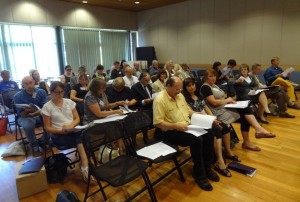
On 15-16 February 2013 the conference “Ukraine: Language, Culture, Identity” took place at Monash University. The conference was held under the joint auspices of the Mykola Zerov Centre for Ukrainian Studies at Monash University, the Ukrainian Studies Association of Australia and the Shevchenko Scientific Society in Australia.
The conference attracted the largest contingent of international Ukrainian Studies specialists hitherto assembled in Australia. Ukrainian universities and the National Academy of Sciences of Ukraine were represented by four scholars. There were also four scholars from Canadian universities and one each from Italy and New Zealand. As expected, the largest number of papergivers – eight – were based in Australia. 63 people attended the conference. There were eighteen presentations.
The diversity of the conference did not end here. It brought together experienced and well-known scholars with postgraduate students researching their PhD projects. Among the scholarly disciplines represented were sociology and media studies, literary studies, linguistics, cultural studies and cultural history, medical anthropology, diaspora studies and memory studies. Within this interdisciplinary space conference participants examined the identities of people in Ukraine and others who have a connection to Ukraine. They discussed identity shifts under the pressure of cultural and political forces, as well as the retention and evolution of identities.
Keynote: Volodymyr Kulyk
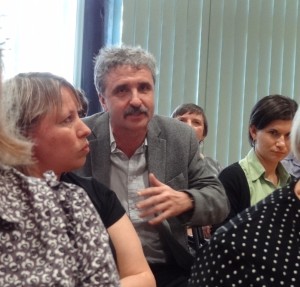
One of the conference’s keynote presentations, “Language and Identity in Post-Soviet Ukraine,” was delivered by Dr Volodymyr Kulyk (National Academy of Sciences of Ukraine), who at the time of the conference held a visiting fellowship at Harvard University. On the basis of extensive polls Dr Kulyk shed light on the growth in strength of the civic notion of Ukrainianness as a sense of belonging to a Ukrainian nation-state and the corresponding decline of the view that Ukrainianness is inherent and defined by ethnos and culture. Among the fascinating and sometimes paradoxical phenomena that Dr Kulyk described was the identification of Ukrainian as their native language by many respondents who made minimal use of Ukrainian in everyday life.
Keynote: Serhy Yekelchyk
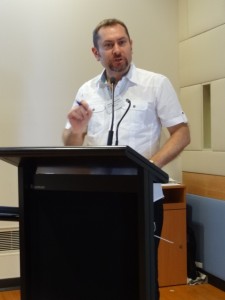
No less revealing of cultural realities in present-day Ukraine was the keynote address of Professor Serhy Yekelchyk (Victoria University, Canada), a former Visiting Scholar at Monash University. In his paper, “Memory Wars on the Silver Screen: Ukraine and Russia Look Back at the Second World War,” Professor Yekelchyk reported on the generally negative stereotypes of Ukrainians in war movies commissioned by the government of the Russian Federation or sponsored by oligarchs beholden to it. Such films characteristically fail at the box office, but are later broadcast on television, in Ukraine as well as in Russia, and are easily available over the internet. The weak Ukrainian film industry has not developed a recognisably Ukrainian vision of the Second World War. It remains an open question whether Mykhailo Il’ienko’s new film Firecrosser is able to fill this lacuna.
Literature and Culture
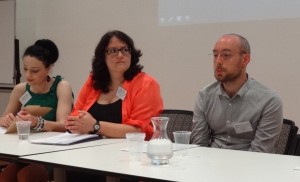
Dr Olena Haleta (Lviv National University), an invited guest of the conference, presented her conclusions from research into Ukrainian literary anthologies of recent decades. Dr Haleta interpreted this genre in its present form as a means for experimenting with new forms of cultural identity through combining and juxtaposing texts originally remote from one another.
The construction of identities through literary texts was a theme common to papers of scholars who inquired into the work of individual authors. Professor Natalia Pylypiuk (University of Alberta, Canada) considered the philosopher Hryhorii Skovoroda, Professor Oleh Ilnytzkyj – Mykola Hohol’ (or Nikolai Gogol’), Alessandro Achilli (University of Milan, Italy) – Vasyl’ Stus, and Marko Pavlyshyn – Marko Vovchok. Olga Pressitch (University of Victoria, Canada) analysed the popular Soviet film Chasing Two Hares and described the shift in the evaluation of Ukrainian identity markers when the film, shot in Ukrainian, was dubbed into Russian for release.
Ukraine Today

Several speakers examined the self-image of contemporary Ukrainians. Olga Oleinikova (University of Sydney) proposed a classification of citizens of Ukraine according to their choice of life strategy in the difficult circumstances of a society in economic transition. Khrystyna Chushak (Monash) analysed the image of the “homo sovieticus” in the discourse of Ukrainian intellectuals. Associate Professor Natalia Chaban (University of Canterbury, New Zealand) examined Ukrainian society’s views on the European Union and on Europeanness as an element of the self-definition of Ukrainians. Professor Chaban was unable to travel to Melbourne for the conference, and her paper was presented by Dr Eva Polonska-Kimunguyi (Monash).
Among the conference’s participants from Ukraine were members of the Institute of Journalism of Kyiv National University. Professor Alla Boyko gave a critical evaluation of the influence of contemporary religious media upon identity formation in Ukraine. Professor Natalya Sydorenko examined the role of the press in the shaping of national self-awareness in historical perspective and in the present day.
Ukrainians Abroad
Several presentations were concerned with the Ukrainian diaspora, in Australia in particular. Dr Halyna Koscharsky (Macquarie University) read a paper written in co-authorship with Dr Geoffrey Hull on the conservation in émigré communities, including that of Ukrainians in Australia, of language practices that in the linguistic mainstream have changed as a result of language standardisation.
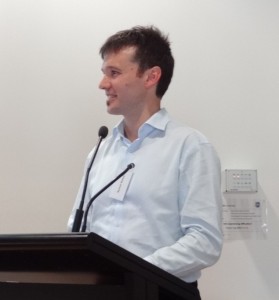
Symon Kohut used the framework of research into bilingual education to reflect on his personal experience, where the father speaks with the child in Ukrainian only and the mother only in English. Yana Ostapenko (RMIT University) used Geert Hofstead’s reflections on cultural proximity and distance as a basis for conceptualising assimilation and cultural retention in Australia’s Ukrainian community.
Using literary and non-fictional texts by first-generation Ukrainian immigrants to Australia, Stephanie Prociw-Charalambous (Monash) demonstrated that the Ukrainian Community in Australia may be classified as a “diaspora” according to the terms of the definition proposed by William Safran. The audience was especially interested in the paper of Dr Victoria Team (Monash), who reported the results of research into the views of new immigrants from Ukraine to Australia on the relationship between diet and health. In this belief system pork fat (salo) plays a fascinating and at times peculiar role.
